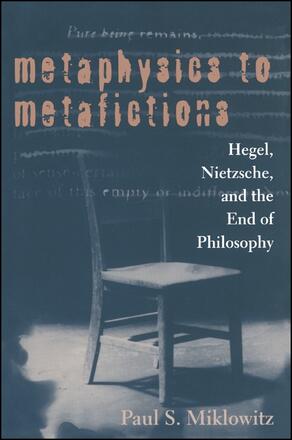
Metaphysics to Metafictions
Hegel, Nietzsche, and the End of Philosophy
Alternative formats available from:
Examines the key role played by Nietzsche in the undoing of the Hegelian system of totality.
Description
Through close reading and interpretive reflections, Paul Miklowitz examines key dialectics in Hegel's Phenomenology of Spirit in order to come to terms with the undoing of the Hegelian system of totality inaugurated by Nietzsche. In his interpretation of the Phenomenology, Miklowitz shows how Hegel skillfully manipulates narrative structures, even while disavowing them. Tracing the self-undermining implications latent in Hegel's strategy of retrospective phenomenological reconstruction through to their "coming to self-consciousness" in Nietzsche's central character of Zarathustra, Miklowitz argues that Hegel leaves a problematic legacy to philosophers, claiming to have achieved comprehensive wisdom in "absolute knowing," and that Nietzsche responds by undermining the authority of the philosopher. Thus metaphysical questions are reformulated and resolved in narratives self-consciously mediated by irony: they become "metafictions," philosophic imperatives that expressly acknowledge their own createdness and call into question their universality.
In examining Nietzsche's post-apocalyptic and anti-Hegelian perspectivism, Miklowitz focuses on Thus Spoke Zarathustra, offering a new interpretation of "eternal return" in light of the problematic character of repetition intrinsic to the narrative structure of metaphysical illumination: Nietzsche's project, unlike Hegel's metaphysics, proposes to serve philosophy not as a uniquely true source of doctrine, but rather as an exemplary experiment in metafiction. Finally, Miklowitz also briefly examines some of the "postmodern" effects of this intellectual history and its consequences for the theoretical discourse of philosophy—whose end (in the sense of a telos) was reached in Hegel, only to have its end (in the sense of death or destruction) proclaimed by Nietzsche.
Paul S. Miklowitz is Associate Professor and Chair of Philosophy at California Polytechnic State University.
Reviews
"This is a very good book. It has an important thesis—the fictionalization of discourse as the quintessentially modern reaction to the presumptive realization of metaphysics in Hegel's philosophy of the absolute. The work outlines in exemplary, if schematic, fashion the key role played by Nietzsche in the undoing of the Hegelian system of totality and marks the points in Hegel that Nietzsche can capitalize on." — Cyril O'Regan, author of The Heterodox Hegel